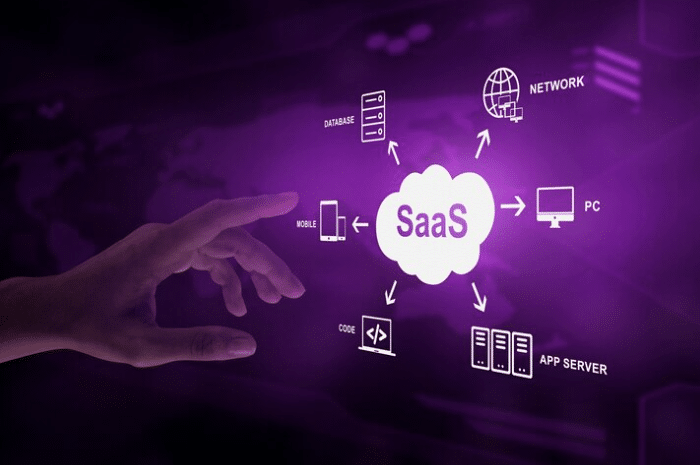SaaS ERP, or Software as a Service Enterprise Resource Planning, refers to a cloud-based software solution that offers comprehensive enterprise resource planning functionality as a service over the internet. Unlike traditional on-premises ERP systems, SaaS ERP operates in the cloud, providing organizations with access to integrated business management tools without the need for extensive in-house hardware and infrastructure.
In simpler terms, SaaS ERP is a cloud-hosted ERP solution that allows businesses to access and utilize critical enterprise resource planning software and features on a subscription basis, offering advantages such as accessibility, cost-efficiency, and scalability.

Software as a Service (SaaS) ERP: Revolutionizing Business Management
Software as a Service (SaaS) Enterprise Resource Planning (ERP) is a game-changer in the realm of business management. This concise article provides a clear overview of SaaS ERP, its role in modern businesses, key benefits, and considerations. With a word count of 300, let’s explore how SaaS ERP is transforming the way organizations operate and make informed decisions.
1. Introduction to SaaS ERP
Software as a Service (SaaS) ERP is a cloud-based solution that delivers enterprise resource planning functionality as a service over the internet. Unlike traditional ERP systems that require on-premises installations, SaaS ERP operates in the cloud, providing businesses with access to comprehensive ERP tools without the need for extensive hardware or infrastructure.
2. The Role of SaaS ERP in Modern Business
SaaS ERP plays a crucial role in modern businesses by offering:
- Accessibility: Access to ERP tools from anywhere with an internet connection, enabling remote work and global collaboration.
- Cost Savings: Reduced upfront costs, as there is no need for in-house hardware, and lower ongoing maintenance expenses.
- Scalability: The flexibility to scale up or down based on business needs, making it ideal for growing enterprises.
- Automatic Updates: Regular updates and maintenance are handled by the SaaS ERP provider, ensuring the system is up-to-date and secure.
3. Key Benefits of SaaS ERP
SaaS ERP offers various benefits, including:
- Cost-Efficiency: Lower initial costs and predictable subscription-based pricing, reducing the financial burden on businesses.
- Accessibility: Cloud-based access enables real-time data sharing and collaboration, even for remote teams.
- Security: SaaS ERP providers often employ robust security measures to protect data from breaches and ensure data privacy.
- Flexibility: Scalable and customizable to meet specific business requirements, providing tailored solutions.
- Automatic Updates: Regular updates and maintenance are handled by the provider, ensuring the system remains current and secure.
4. Considerations for Implementing SaaS ERP
While SaaS ERP offers significant advantages, organizations should consider:
- Data Security: Trusting a third-party provider with critical business data requires a strong focus on security measures.
- Internet Connectivity: A reliable internet connection is essential for accessing SaaS ERP tools, which may pose challenges in areas with limited connectivity.
- Customization: SaaS ERP systems may offer limited customization compared to traditional ERP solutions, so businesses should assess their specific needs.
In conclusion, SaaS ERP is a cloud-based solution that simplifies business management by offering accessible, cost-effective, and scalable ERP tools. Its benefits are ideal for businesses looking to optimize their operations and enhance their decision-making capabilities while considering factors like data security, internet connectivity, and customization. SaaS ERP is transforming the way organizations operate, making it a valuable asset for modern businesses.
SaaS ERP’s rise is transforming how businesses manage their resources and data, enabling them to adapt to a rapidly changing business environment with agility and efficiency. As technology continues to evolve, SaaS ERP will likely keep pace with emerging trends, incorporating innovative features and enhancements. The advantages of accessibility, cost-efficiency, scalability, and security make SaaS ERP a valuable asset for businesses looking to streamline operations and gain a competitive edge.
It’s worth noting that SaaS ERP is not a one-size-fits-all solution, and organizations must carefully evaluate their unique requirements before adopting this cloud-based approach. Understanding the level of customization needed, considering data security measures, and assessing internet connectivity are essential steps in the decision-making process.
In summary, SaaS ERP is revolutionizing the way businesses manage their operations by providing accessible and cost-effective ERP tools through the cloud. As organizations increasingly prioritize flexibility and adaptability, SaaS ERP stands as a practical solution for addressing the complex needs of modern businesses, allowing them to remain agile and responsive in an ever-evolving business landscape.